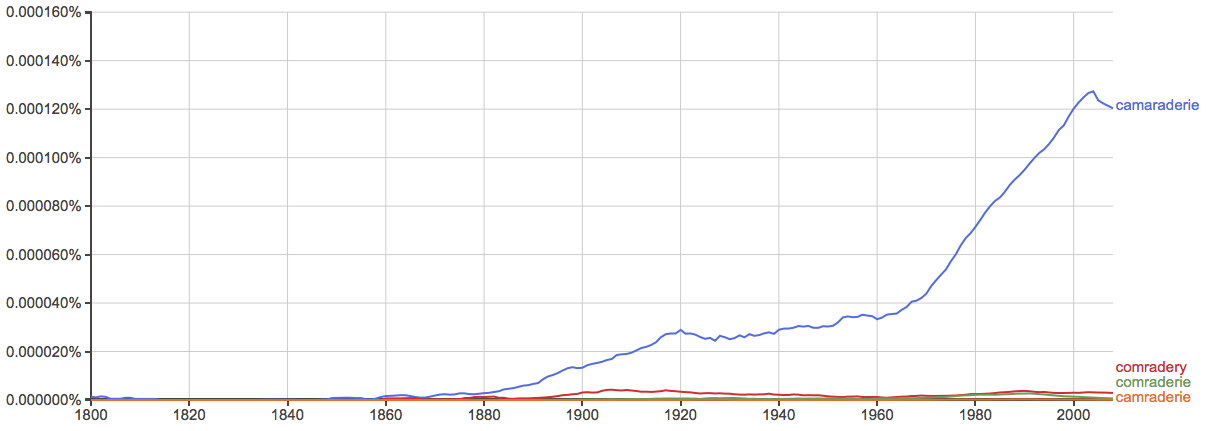English borrows heavily from other languages, and the Romantic languages are no exceptions. Many English words can be traced to their origins in Italian, Spanish, or French.
Camaraderie is one of these words. Like the word comrade, camaraderie comes from French, and it has been used in English since the mid-19th century.
What about comradery? Is this another version of the same word, or a different word entirely? Many writers aren’t sure of the answer. Luckily, the answer is quite clear-cut.
What is the Difference Between Comradery and Camaraderie?
In this post, I will compare comradery vs. camaraderie. I will outline the correct spelling and use it in a few example sentences to illustrates its proper context.
I will also demonstrate the use of a mnemonic tool that will help you decide whether to use comradery or camaraderie in your own writing.
When to Use Camaraderie
 What does camaraderie mean? Camaraderie is a noun that means brotherhood or friendship, especially united by a common cause, and especially in literal or figurative combat.
What does camaraderie mean? Camaraderie is a noun that means brotherhood or friendship, especially united by a common cause, and especially in literal or figurative combat.
This word is derived from the French camarade.
Here are a few examples of camaraderie in a sentence,
- The soldiers felt an intense camaraderie as they entered into battle.
- The boys’ camaraderie on the football team was unexpected, given their enmity in most social situations.
- Gina spurned the camaraderie of her teammates, preferring to sulk alone on the bus ride back to school.
- Other couples place importance on the entertainment, interaction and camaraderie of having an artist at their wedding. –The New York Times
When to Use Comradery
 What does comradery mean? Comradery is a North-American variant spelling of the word camaraderie. While some dictionaries list it, it is generally considered a spelling error.
What does comradery mean? Comradery is a North-American variant spelling of the word camaraderie. While some dictionaries list it, it is generally considered a spelling error.
There are also other common misspellings of camaraderie. They include,
- Comradery
- Comraderie
- Camraderie
In his usage guide, Bryan Garner explains that camaraderie is routinely misspelled because of a mistaken association with comrade,
Although the words camaraderie and comrade are etymologically related—both derive from the French camarade—the English spellings are well enough established that each of the variant spellings is an error.¹
For a point of reference, Garner estimates that the frequencies of the above spellings (camaraderie vs. comradery vs. comraderie vs. camraderie) is 1,167:26:7:1, respectively.
In other words, as Garner says, the English spellings are well enough established that any variations constitute a spelling error.
Here is a Google Ngram that mirrors Garner’s estimation of usage.

As you can see, all variations pale in comparison to camaraderie.
Trick to Remember the Difference
There really isn’t a good reason to use any spelling other than camaraderie. Most of your readers will see it as a spelling error, making it needlessly distracting. It is best to stick with camaraderie.
This makes remembering comradery vs. camaraderie incredibly easy.
- You should always choose camaraderie.
- Comradery is considered a misspelling.
You can use the word’s origins in French as a reminder that camaraderie is the correct variant of this word. Since camarade is closer in spelling to camaraderie than comradery, you will always be able to remember which is the correct version.
Also, if you simply say the word aloud, you will be able to determine that comradery isn’t the correct spelling. Camaraderie has five syllables (kah-mə-rah-de-ree).
Summary
Is it camaraderie or comradery? Camaraderie and comradery are two different spellings of the same word.
- Camaraderie is the correct form; it is derived from the French word camarade.
- Comradery is a misspelling that stems from a misunderstanding of the word’s origins.
As long as you can remember the root word camarade, you will be able to remember which version of this word is correct—camaraderie is much closer to the original French.
Don’t forget—if you are even stuck choosing comradery or camaraderie, you can always refresh your memory with reread of this article.
¹Reference: Garner’s Modern English Usage, 2016, p. 139.
Contents
